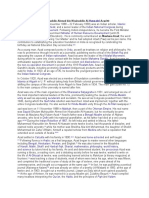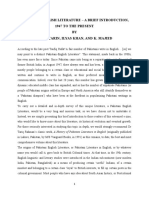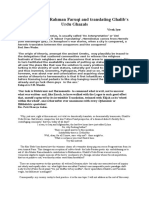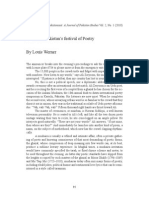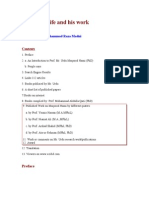HJHJF
HJHJF
Uploaded by
khanif khanCopyright:
Available Formats
HJHJF
HJHJF
Uploaded by
khanif khanOriginal Description:
Original Title
Copyright
Available Formats
Share this document
Did you find this document useful?
Is this content inappropriate?
Copyright:
Available Formats
HJHJF
HJHJF
Uploaded by
khanif khanCopyright:
Available Formats
1857 was an armed uprising in British India against the British colonial rule and
was also popularly remembered as the 'First War of Independence'. This was a
turning point in his life because he was an eye-witness to the catastrophe. Hali
drifted from job to job for several years, arriving eventually in Lahore, where he
came to be a personal servant of Chayanne Mehdi in the mid-1870s, where he began to
compose his epic poem, the Musaddas e-Madd o-Jazr e-Islam ("An elegiac poem on the
Ebb and Tide of Islam"), at the request of Syed Ahmed Khan, under the new pseudonym
of Hali ("The Contemporary").[2][not in citation given] Hali also wrote one of the
earliest works of literary criticism in Urdu, Muqaddamah-i Shay'r-o-Sha'iri. "Above
all, its critical Preface 'the Muqaddima-i-Sher-o-Shairi' gave a new and purposeful
trend to Urdu poetry and led the way to literary criticism in Urdu literature."[4]
Some scholars of Pakistani nationalism also consider the Mussadas an important text
for the articulation of a future Muslim nation, Pakistan, which eventually was
created in 1947.[5]
Works[edit]
A biography of Ghalib, Yaadgar-e-Ghalib - life and works of Mirza Asadullah Khan
Ghalib (1797-1869), a legendary Urdu language poet of the 19th-century
A biography of Saadi Shirazi, Hayat-e-Saadi - life and works of celebrated Persian
language scholar and poet 'Saadi Shirazi' (1210-1292) of the 13th-century
A biography of Sir Syed Ahmed Khan, Hayat-e-Javed - life and works of a renowned
educationist, scholar and social reformer 'Sir Syed Ahmed Khan' (1817-1898) of the
19th-century[6][3]
Hali also wrote a poem "Barkha Rut"
"Woh Nabiyon Mein Rahmat Laqab Paanaywala", a naat written by Altaf Hussain Hali[7]
Hayat-i-Javed, a biography of Sir Syed Ahmed Khan
Death and legacy[edit]
Altaf Hussain Hali died in 1914. Pakistan Post issued a commemorative postage stamp
in his honor on 23 March 1979 in its 'Pioneers of Freedom' series. "His great
'Musaddas' is one of the most inspiring poems in Urdu literature and had a lasting
influence on the minds and attitudes of the Muslims in the sub-continent and
continues to inspire them to this day."[4]
References[edit]
^ Jump up to: a b c Profile of Altaf Hussain Hali on aligarhmovement.com website.
Retrieved 13 February 2017.
^ Jump up to: a b Musaddas-e-Hali by Altaf Hussain Hali. Retrieved 13 February
2017.
^ Jump up to: a b Hayat-e-Javed by Altaf Hussain Hali, digitized on Academy of the
Punjab in North America (APNA) website. Retrieved 13 February 2017.
^ Jump up to: a b "Pioneers of Freedom March 23, 1979". Profile and image of
commemorative postage stamp issued on 23 March 1979 by Pakistan Post in honor of
Altaf Hussain Hali. Archived from the original on 15 February 2017. Retrieved 13
February 2017.
Jump up ^ Raja, Masood Ashraf (2010). Constructing Pakistan: Foundational Texts and
the Rise of Muslim National Identity, 18571947. Oxford: Oxford University Press.
ISBN 9780195478112
Jump up ^ Hayat-e-Javed by Altaf Hussain Hali, first published in the year 1900,
digitized on rekhta.org website. Retrieved 13 February 2017.
Jump up ^ "Woh Nabiyon Mein Rahmat Laqab Paanaywala", a Naat written by Altaf
Hussain Hali, recited by Junaid Jamshed on YouTube. Retrieved 13 February 2017.
External links[edit]
Maulana Altaf Hussain Hali Karwaan-e-Aligarh
Altaf Hussain Hali in Hindi / Urdu
Hali Trust site
Hali at Urdupoet.net
Musaddas-e-Hali
Hayat-e-Saadi by Hali
Yadgar-e-Ghalib by Hali
Hayat-e-Javed (1) by Hali
Hayat-e-Javed (2) by Hali
Authority control
WorldCat Identities VIAF: 12480239 LCCN: n80087751 SUDOC:
You might also like
- Ghazals of Ghalib Versions From The UrduDocument209 pagesGhazals of Ghalib Versions From The UrduMohid AhsanNo ratings yet
- Dozakhnama - Conversations in Hell Between Ghalib and Manto by Rabisankar Bal Arunava Sinha TranslatorDocument291 pagesDozakhnama - Conversations in Hell Between Ghalib and Manto by Rabisankar Bal Arunava Sinha Translatorzain67% (9)
- DKDKDocument2 pagesDKDKkhanif khanNo ratings yet
- Altaf Hussain HaaliDocument3 pagesAltaf Hussain HaaliSyed Paras100% (1)
- Afzal Ahmed Syed and Contemporary Urdu Poetry of PakistanDocument25 pagesAfzal Ahmed Syed and Contemporary Urdu Poetry of PakistanBaisakhi MitraNo ratings yet
- Neilesh Bose - Muslim Literary Culture in Late Colonial IndiaDocument26 pagesNeilesh Bose - Muslim Literary Culture in Late Colonial IndiamubashirNo ratings yet
- The Maulana Who Loved Krishna PDFDocument8 pagesThe Maulana Who Loved Krishna PDFarjun_nbrNo ratings yet
- Faiz Ahmad Fai1Document6 pagesFaiz Ahmad Fai1Neetu SharmaNo ratings yet
- A Brief History of Pashto LiteratureDocument6 pagesA Brief History of Pashto LiteratureRaza Wazir100% (1)
- Urdu Literature and Nationalism in Colonial IndiaDocument17 pagesUrdu Literature and Nationalism in Colonial IndiameharjishaNo ratings yet
- A Brief History of Pashto LiteratureDocument2 pagesA Brief History of Pashto LiteratureAmir Nangyal0% (1)
- A Brief History of Pashto LiteratureDocument6 pagesA Brief History of Pashto LiteratureIlham SherzadNo ratings yet
- Pak English GenreDocument10 pagesPak English GenreMuhammad HaseebNo ratings yet
- Ahemad Ali1 PDFDocument40 pagesAhemad Ali1 PDFshaikh arefNo ratings yet
- Allama Abdul Sattar Khan NiaziDocument38 pagesAllama Abdul Sattar Khan Niazisyed wajihNo ratings yet
- Essay On Allama IqbalDocument2 pagesEssay On Allama Iqbalanayarajpoot786786No ratings yet
- Munishi Naval Kishore-Aik Mazmoon PDFDocument2 pagesMunishi Naval Kishore-Aik Mazmoon PDFrhasnieNo ratings yet
- Chapter - Viii: Aligarh Movement Impact and ExpansionDocument37 pagesChapter - Viii: Aligarh Movement Impact and ExpansionAbdul Manan NisarNo ratings yet
- DR Hotchand Molchand GurbuxaniDocument7 pagesDR Hotchand Molchand GurbuxaniMuhammad HabibNo ratings yet
- 4.persian Literature (1218)Document2 pages4.persian Literature (1218)Naba ChandraNo ratings yet
- Sa'di: The Poet of Life, Love and CompassionFrom EverandSa'di: The Poet of Life, Love and CompassionRating: 5 out of 5 stars5/5 (1)
- Hassan Bin ThabitDocument6 pagesHassan Bin Thabitnayear50% (2)
- Muslim PersonalitiesDocument2 pagesMuslim PersonalitiesRahem AhsanNo ratings yet
- ADONIS Powerful Voice of Modern Arabic PoetryDocument3 pagesADONIS Powerful Voice of Modern Arabic PoetryIOSRjournalNo ratings yet
- Aga Khan (1877-1957) Came From A Very...Document2 pagesAga Khan (1877-1957) Came From A Very...Saad AliNo ratings yet
- Sindhi Literature During Different PeriodsDocument7 pagesSindhi Literature During Different PeriodsRashid AbbasNo ratings yet
- Afghanistan LiteratureDocument6 pagesAfghanistan LiteratureAnimeLoverNo ratings yet
- Twenty Three Years - Ali DashtiDocument127 pagesTwenty Three Years - Ali DashtidudhaiNo ratings yet
- QDocument12 pagesQHaseeb HassanNo ratings yet
- Agha Shahid Ali and The Modern Indian English Poetic TraditionDocument34 pagesAgha Shahid Ali and The Modern Indian English Poetic TraditionAmirNo ratings yet
- Historical Overview of The Execution of Iqbal's ThoughtDocument8 pagesHistorical Overview of The Execution of Iqbal's ThoughtKhilafatMediaNo ratings yet
- Allama Muhammad Iqbal PDFDocument24 pagesAllama Muhammad Iqbal PDFFrank Adams100% (1)
- Khwaja Hasan NizamiDocument24 pagesKhwaja Hasan Nizamisarkar999No ratings yet
- Allama Muhammad AsadDocument21 pagesAllama Muhammad AsadMuhammad Zaheer IqbalNo ratings yet
- Asian LiteratureDocument7 pagesAsian LiteratureGrace EspejoNo ratings yet
- ProgressiveCommieLiterature PDFDocument61 pagesProgressiveCommieLiterature PDFSandeep BalakrishnaNo ratings yet
- Allama Iqbal & His Efforts: Assignment#1Document6 pagesAllama Iqbal & His Efforts: Assignment#1Anas NisarNo ratings yet
- Abul Kalam AzadDocument8 pagesAbul Kalam AzadSIRISHANo ratings yet
- History of Pakistani Literature in English Omer TareenDocument7 pagesHistory of Pakistani Literature in English Omer TareenFizza SattarNo ratings yet
- Jamal-al-Din Afghani: Sayyid Mu Ammad Ibn Afdar Husaynī (Born 1838Document4 pagesJamal-al-Din Afghani: Sayyid Mu Ammad Ibn Afdar Husaynī (Born 1838Mushtak MuftiNo ratings yet
- 024 - Screenshot (2459)Document2 pages024 - Screenshot (2459)Prasanth mallavarapuNo ratings yet
- 20168607Document17 pages20168607calfrancescoNo ratings yet
- Kabir (1398-1518) (1) 14-15 Was A 1Document2 pagesKabir (1398-1518) (1) 14-15 Was A 1kushkuril24No ratings yet
- Kazi Nazrul IslamDocument5 pagesKazi Nazrul IslamStephen GreenNo ratings yet
- Muhammad AsadDocument14 pagesMuhammad Asadlna_cooolmadina5742No ratings yet
- M. Mahad Pak-Study AssignmentDocument4 pagesM. Mahad Pak-Study Assignmentmuhammadaashan25No ratings yet
- SRF Sabk I HindiDocument59 pagesSRF Sabk I HindiShahnawaz SheikhNo ratings yet
- Representative Texts and AuthorsDocument66 pagesRepresentative Texts and AuthorsTjhay Noche100% (5)
- Literature Beyond Borders-Word FormatDocument7 pagesLiterature Beyond Borders-Word FormatKarthick RmNo ratings yet
- SSRN Id2782874Document10 pagesSSRN Id2782874Irum ZeeshanNo ratings yet
- Sindhi Response PaperDocument4 pagesSindhi Response Paperbilal bashirNo ratings yet
- Allama Muhammad Iqbal and His Theories: Malik Ahmer ShamimDocument7 pagesAllama Muhammad Iqbal and His Theories: Malik Ahmer ShamimHassan RazaNo ratings yet
- WorksDocument1 pageWorksAmitesh MauryaNo ratings yet
- Allama Muhammad Iqbal: M. Salman Shafiq M. Waleed Khalid Naeem Jawahar Jauhar Saeed KhanDocument9 pagesAllama Muhammad Iqbal: M. Salman Shafiq M. Waleed Khalid Naeem Jawahar Jauhar Saeed Khanwaleed_124No ratings yet
- Rise of Persian Literature in IndiaDocument6 pagesRise of Persian Literature in IndiaAshutoshNo ratings yet
- Muhammad IqbalDocument3 pagesMuhammad IqbalNomi KhosaNo ratings yet
- Ziaul HassanDocument1 pageZiaul HassanAbdul Jabbar QuraishiNo ratings yet
- CH-3 - Decline of The Mughal EmpireDocument4 pagesCH-3 - Decline of The Mughal EmpiredebdulaldamNo ratings yet
- Mirza GhalibDocument22 pagesMirza GhalibDinbandhu Sharma100% (1)
- Paradigms of Style - A Study of Zulfikar Ghoses Novels PDFDocument196 pagesParadigms of Style - A Study of Zulfikar Ghoses Novels PDFJeselyn Requioma100% (1)
- 11 - Chapter 5 PDFDocument39 pages11 - Chapter 5 PDFAmirNo ratings yet
- Urdu Books and WritersDocument6 pagesUrdu Books and WritersJùñâïd Mûmtæz100% (1)
- Assignment GhazalDocument8 pagesAssignment GhazalSeenauth VeerajNo ratings yet
- A Translation of Jaun Elias Preface of Shayad Rc3atv8bDocument58 pagesA Translation of Jaun Elias Preface of Shayad Rc3atv8bjasimnaveed200No ratings yet
- 8 2 2012 9 33 59 AMCommerce SyllabusDocument68 pages8 2 2012 9 33 59 AMCommerce SyllabusRashmi Ranjan PanigrahiNo ratings yet
- Prof. Shamsur Rahman Faruqi and Translating Ghalib's Urdu GhazalsDocument42 pagesProf. Shamsur Rahman Faruqi and Translating Ghalib's Urdu GhazalsVivek BalramNo ratings yet
- Literature Beyond Borders-Word FormatDocument7 pagesLiterature Beyond Borders-Word FormatKarthick RmNo ratings yet
- Ghalib Ghazal - UrduDocument29 pagesGhalib Ghazal - UrduRaza478No ratings yet
- Some Lines About Maqsood HasniDocument19 pagesSome Lines About Maqsood HasniSha JijanNo ratings yet
- 4947 19328 2 PB PDFDocument6 pages4947 19328 2 PB PDFWassemAbbasNo ratings yet
- India International Centre India International Centre QuarterlyDocument9 pagesIndia International Centre India International Centre QuarterlyAshraful huqNo ratings yet
- Research-Enlighten@glasgow Ac UkDocument315 pagesResearch-Enlighten@glasgow Ac UkRauha SalaamNo ratings yet
- 2012 Topic III Poets of The Past and PresentDocument46 pages2012 Topic III Poets of The Past and PresentShafqat ShakeebNo ratings yet
- Ghalibiana - A Desertful of RosesDocument6 pagesGhalibiana - A Desertful of RosesBrij Mohan SinghNo ratings yet
- Best GhazalsDocument1,073 pagesBest GhazalsSandip S Nagare83% (6)
- DozakhnamaDocument14 pagesDozakhnamatahirmmuradNo ratings yet
- Pak Studies Book English Medium CHDocument28 pagesPak Studies Book English Medium CHRans GulbazNo ratings yet
- Mr. UrduDocument30 pagesMr. Urdumaqsood hasniNo ratings yet
- Ghalib TimelineDocument2 pagesGhalib Timelinemaryam-69No ratings yet
- SRF Faruqi On Faruqi 2013Document23 pagesSRF Faruqi On Faruqi 2013tvphile1314100% (1)
- Translating The Millennium - Indian Literature in The Global MarketDocument15 pagesTranslating The Millennium - Indian Literature in The Global MarketParulNo ratings yet
- Hazaaron Khwahishen Aisi LyricsDocument6 pagesHazaaron Khwahishen Aisi Lyricsmchaudhry10No ratings yet
- Mirza GhalibDocument36 pagesMirza Ghalibmailwriter19No ratings yet
- ScriptDocument5 pagesScriptAbhi ChauhanNo ratings yet
- Mirza Ghalib - Poems - 2Document5 pagesMirza Ghalib - Poems - 2Navdeep GillNo ratings yet







































